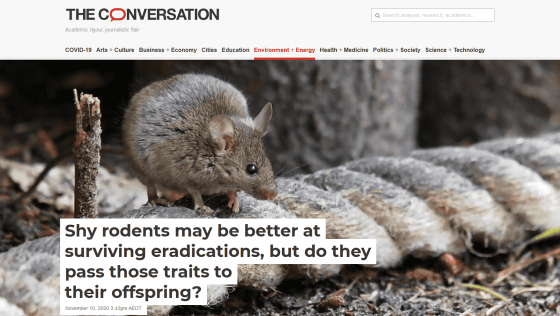Will the 'hard-to-remove personality' of mice that survived large-scale extermination operations be passed on to the next generation?

Since animals such as mice, which have strong viability, can disturb the ecosystem as alien species, large-scale extermination operations are often carried out. The results of experiments and confirmations have been announced as to whether the 'careful and difficult-to-catch personality' of the mice that survived such an extermination operation will be passed on to the next generation.
Testing transgenerational transfer of personality in managed wildlife populations: a house mouse control experiment --Johnstone ---- Ecological Applications --Wiley Online Library
Shy rodents may be better at surviving eradications, but do they pass those traits to their offspring?
https://theconversation.com/shy-rodents-may-be-better-at-surviving-eradications-but-do-they-pass-those-traits-to-their-offspring-146924

Alien species can be harmful to ecosystems and can have irreparable consequences such as the extinction of valuable endemic species. In particular, endemic species that live on the islands of Australia have evolved in an environment that is not endangered by predators, so carnivorous alien species such as rats cannot be recognized as wonders and may be easily preyed on. That thing.
For this reason, large-scale extermination of alien species is occasionally carried out. On
However, attempts to eradicate alien species have not always been successful, with an average of 11% of mammal extermination operations failing, with mouse extermination rates reaching 75%. There are also survey results .
Mice with strong fertility will increase in number as soon as they fail to be exterminated. A 2016 study analyzing rat extermination on Henderson Island in the South Pacific reported that about 50 mice survived the extermination operation, resulting in an increase in populations of about 75,000 in just two years. it was done.

by
In addition, there is a concern about the breeding of individuals who survived the extermination operation, 'Isn't it possible that the number of individuals with personality traits that make it easier to survive human extermination operations will increase selectively?' Bold and active individuals are thought to be easy to get rid of because they are susceptible to traps, but individuals with a cautious and timid personality are less likely to be caught by traps or eat poisoned food and are exterminated. It is considered difficult. If the parent's personality is passed on to the child, the re-breeding of a cautious and timid individual who survived the extermination operation could lead to an increase in 'hard-to-remove individuals.'
It is said that the personality traits of animals, including humans, are shaped by a combination of experience, learning from parents, and genetic factors, and humans selectively select individuals with favorable personalities for domesticating dogs, cattle, and horses. I have bred it. In order to see if this tendency also applies to wild mice, a research team at the University of Sydney used mice as model animals and conducted an experiment to reproduce the 'scenario of rebreeding after failure of eradication'.
The research team collected wild mice in traps, released them into the field in the experimental facility, and photographed each individual with a camera to investigate the character of the mouse. Mice that are nocturnal but frequently move to bright places are classified as 'active and bold personality', and based on their behavior, they are classified as 'gentle and cautious personality' or 'intermediate personality'. I classified it.
Subsequently, the research team divided the mice into groups according to their personality, released them in the yard of the experimental facility, bred them for one generation, and captured them again 10 weeks after the offspring grew to some extent. Then, when we investigated the personality of mice born from populations of the same personality, we found that even rats born of parents of the same personality have a wide range of personalities. In other words, offspring born from lively and bold mice were not always lively and bold, and mice born from cautious mice did not tend to be cautious.

by Nick Harris
It is unclear whether the same result will be obtained in animals other than mice, but at least in the extermination of mice, it is suggested that the offspring do not inherit the personality of the surviving individual, but that the next generation of mice will have a wide range of personalities. I did. 'This suggests that we are unlikely to face a population that cannot be eliminated,' 'this was encouraging news,' the research team said.
Related Posts:







